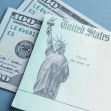Shutdowns because of the COVID-19 pandemic have caused many people to lose their jobs, which could cause a large number of people to file for bankruptcy in 2021. As of September 2020, the number of bankruptcy filings has been lower than in 2019. According to Forbes.com, this could have to do with “federal stimulus payments, mandated mortgage and other loan forbearance, unemployment insurance enhancement and the additional support provided by the Coronavirus Aid, Relief, and Economic Security (CARES) Act and other government programs.”
According to Ike Shulman, a bankruptcy lawyer and co-founder of the National Association of Consumer Bankruptcy Attorneys (NACBA), a Washington, D.C.-based professional group, people will be filing for bankruptcy who never would have thought that they would. It will not be people who spent too much, but people who were responsible and paid their bills on time who were laid off when the pandemic hit. According to Shulman, “The rug got pulled out from under them by something they had no control over. It wasn’t bad financial planning or anything they could be prepared for.” Small businesses are also being hit hard. Some restaurants and stores had to close for months during COVID-19 shutdowns and are further hurt with capacity restrictions to allow for social distancing.
There are two types of bankruptcy for individuals: Chapter 13 and Chapter 7. Chapter 13 bankruptcy is for people more likely to repay their debts. With Chapter 7, there is usually not a plan set up for individuals to repay their debts. The pandemic will lead to more Chapter 7 filings. Bankruptcy filings may increase in the next 2-3 years. According to Robert Lawless, a bankruptcy researcher and professor at the University of Illinois College of Law, “It’s easy to say that everybody’s out of work, so we’ll have a bunch of bankruptcy filings. But most people struggle for two to five years before they file for bankruptcy. Bankruptcy has a long tail. The time line is going to be long. We’re not talking months but probably two or three years.”
The rules for filing bankruptcy are likely to change due to the pandemic. Some of the reforms include increasing the amount of debt that you can have and still file for Chapter 13 bankruptcy. The original limit to file for Chapter 13 bankruptcy was $2,725,625 according to the Small Business Reorganization Act (SBRA). However, it has now been increased to $7.5 million for one year under the Coronavirus Aid, Relief, and Economic Security Act (CARES Act) which was signed by President Trump on March 27, 2020. This would allow for more small businesses such as sole proprietorships to file as a “small business debtor” under the SBRA. Filing under this classification is cheaper for small businesses than filing for Chapter 11 bankruptcy. Chapter 11 bankruptcy was originally not available for small businesses. This was changed under an amendment to subsection V of Chapter 11 of the Bankruptcy Code. There is also talk of trying to prevent discrimination against people who have filed for bankruptcy by the Small Business Administration, which usually asks people applying for a government loan if they have filed for bankruptcy. Lawless thinks that reform is possible and that some of the bankruptcy law is outdated. “There’s one provision that still allows debtors to exempt a VCR,” he says. “That’s written in the bankruptcy code. There’s a lot of debris in the bankruptcy code like that that needs to be cleared.”
Regarding the stimulus checks, there is a provision in the CARES Act that amended the definition of “income” in the Bankruptcy Code that would keep coronavirus stimulus checks from being considered as income during bankruptcy filings so people could hold on to that income.
The complete ramifications of the COVID-19 pandemic on bankruptcy numbers will not be seen for years to come. What we’re seeing now is only the beginning.






